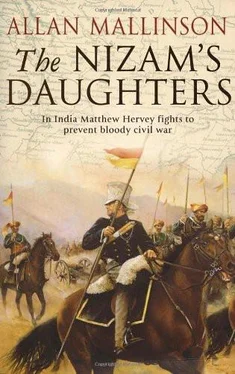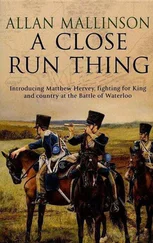Allan Mallinson - Nizams Daughters
Здесь есть возможность читать онлайн «Allan Mallinson - Nizams Daughters» весь текст электронной книги совершенно бесплатно (целиком полную версию без сокращений). В некоторых случаях можно слушать аудио, скачать через торрент в формате fb2 и присутствует краткое содержание. Год выпуска: 2000, ISBN: 2000, Издательство: Bantam, Жанр: Исторические приключения, на английском языке. Описание произведения, (предисловие) а так же отзывы посетителей доступны на портале библиотеки ЛибКат.
- Название:Nizams Daughters
- Автор:
- Издательство:Bantam
- Жанр:
- Год:2000
- ISBN:9780553507140
- Рейтинг книги:5 / 5. Голосов: 1
-
Избранное:Добавить в избранное
- Отзывы:
-
Ваша оценка:
- 100
- 1
- 2
- 3
- 4
- 5
Nizams Daughters: краткое содержание, описание и аннотация
Предлагаем к чтению аннотацию, описание, краткое содержание или предисловие (зависит от того, что написал сам автор книги «Nizams Daughters»). Если вы не нашли необходимую информацию о книге — напишите в комментариях, мы постараемся отыскать её.
Nizams Daughters — читать онлайн бесплатно полную книгу (весь текст) целиком
Ниже представлен текст книги, разбитый по страницам. Система сохранения места последней прочитанной страницы, позволяет с удобством читать онлайн бесплатно книгу «Nizams Daughters», без необходимости каждый раз заново искать на чём Вы остановились. Поставьте закладку, и сможете в любой момент перейти на страницу, на которой закончили чтение.
Интервал:
Закладка:
ALLAN MALLINSON. THE NIZAM’S DAUGHTERS
To
the dwindling but gallant band of members of
The Indian Cavalry Officers’ Association ,
who truly cared about India and their sowars,
this book is with admiration dedicated.
FOREWORD
The Nizam’s Daughters is a work of fiction: the princely state of Chintal never existed. However, the story is firmly rooted in what was happening in India just after Waterloo in the build-up to the third Maratha war. And Chintal (even with its singular rajah) is, I would maintain, not untypical of the minor princely states whose precarious existence depended increasingly on the Honourable East India Company. They were states where young Englishmen like Hervey — as soldiers, administrators or tutors to the royal household — often had disproportion-ate influence.
India had its own military language, of course, and in this story I use some of that language, though in a way, I trust, that will not bar understanding if the words are unfamiliar. But just a few words of explanation of the different terms used by the Honourable East India Company’s army — and others — may be of help. The list is by no means exhaustive, and it must be remembered that terms (and spelling) varied between the Company’s three ‘presidencies’ (Bengal, Madras, Bombay), and were in unofficial use long before being formalized:
Sowar — cavalryman of the lowest rank
Sepoy (sipahi) — infantryman of the lowest rank
Jemadar — junior officer (second lieutenant/lieutenant), infantry or cavalry
Subedar — next senior officer (lieutenant/captain), infantry
Rissaldar — next senior officer (lieutenant/captain), cavalry
Subedar-major — most senior officer (major), infantry
Russaldar-major — most senior officer (major), cavalry
Daffadar — serjeant, cavalry
Lance-daffadar — corporal, cavalry
Havildar — serjeant, infantry
Naik — corporal, infantry
Khansamah — butler
Khitmagar — servant (waiter)
Bhisti — water-bearer/sprinkler
Syce — grass-cutter
Ryot — peasant
Rissalah — a body of cavalry, one-or two-hundred strong
Jingal — gun mounted on and fired from a horse or elephant
I know that all classes of the people look up to me and it will be difficult for another officer to take my place. I know also that my presence would be useful in the settlement of many points… But these circumstances are not momentary… very possibly the same state of affairs which now renders my presence desirable will exist for the next seven years… I have considered whether in the situation of affairs in India at present, my arrival in England is not a desirable object. Is it not necessary to take some steps to explain the causes of the late increase in military establishment, and to endeavour to explode some erroneous notions which have been entertained and circulated on this subject… I conceive there-fore that in determining not to go into the Deccan, and to sail by the first opportunity for England, I consult the public interest not less than I do my own private convenience and wishes.
Major-General Sir Arthur Wellesley, to his brother,
the Governor-General, January 1805
I entreat the Directors to consider whether it was expedient to observe a strict neutrality amidst these scenes of disorder and outrage, or to listen to the voice of suffering humanity and interfere for the protection of the weak and defenceless states who implored our assistance against the ravages of the Pindarees and the Patans.
Lord Minto, Governor-General of India,
to the Court of Directors of the Honourable East
India Company, 1812
I. THE AIDE-DE-CAMP
The Embassy of His Britannic Majesty
to the Court of the Tuileries, Paris, 13 August 1815
Captain Matthew Hervey had put on his best uniform. It was only the second time he had worn it. He was not even sure he should be in levee dress, for his orders to report to the Duke of Wellington’s headquarters had not been concerned with trifles. Yet dress, to a cavalry-man in his situation, could hardly be a matter of indifference, and so he had followed the regiment’s maxim that no senior officer could be affronted by seeing an excess of uniform, even if he were bemused by it. The newest captain of the 6th Light Dragoons was therefore waiting in an ante-room, with dress sabre-tache and mameluke hanging long from his girdle, and tasselled cocked hat, with its ostrich feathers, under his arm, in some degree of apprehensiveness. He wore no aiglets, however. He had bought two pair in London on learning that he was to be promoted and appointed to the duke’s staff, but he did not yet presume to wear those coveted insignia of an aide-de-camp. Indeed, his astonishment at his preferment was scarcely less than when first he had comprehended it only two days ago at the Horse Guards.
Lying full across the open doorway of the ante-room was a springing spaniel, old and ill-smelling, sound asleep and snoring with perfect regularity and constant pitch. It had not been in the least disturbed when the Staff Corps corporal had shown the new ADC into the room a quarter of an hour before, when both had had to step long over the outstretched animal to avoid entanglement of spur and coat, and Hervey, waiting in the otherwise silent embassy, pleased to find some distraction which might help keep his mind from disquiet, was now timing the length and interval of these snuffling crescendos and decrescendos by the ticking of the clock on the chimney piece. There were five seconds for the inspiration, three for the equipoise and four to complete exhalation — then a further five, where all life seemed suspended, before the sequence was repeated da capo . He had counted a dozen of these recitals before seeming suddenly to realize what he was doing. He glanced about anxiously to see if anyone were there, then snapped back to the full attentiveness appropriate for an officer awaiting interview with the commander-in-chief of the allied armies in France.
Outside, the Sunday bells, which had drowned even the sound of hooves on the pavé as he had driven to the Rue Faubourg-Saint-Honoré, had been silent for some time now, and he was relieved that he might thereby be able to hear the duke’s remarks, when they came, with absolute clarity. He was in no doubt of the singularity of his position. He was certain that in the whole of the army there could not be an officer below field rank who would not envy him it. Another quarter of an hour passed, the keen anticipation of the honour to come increasing with every minute. Shortly after eleven-thirty a minor commotion in the ante-hall alerted him to the duke’s return from his daily ride, though it did not disturb the recumbent spaniel. He snapped his whole body to attention, as well as his wits. And then the field marshal was there, at the doorway, looking directly at him. Hervey stepped forward sharply, halting three paces from him, the spaniel occupying all that remained, and bowed his head briskly. The duke made no bow in return, neither did he extend his hand, saying instead simply, ‘Captain Hervey, I am glad you are come. Colonel Grant has need of you. He will be along presently. It will be deuced tricky work, but I should not ask it if I thought it beyond you. Good day then, sir.’
As the duke turned, Hervey saw the young woman in riding dress close by him.
Читать дальшеИнтервал:
Закладка:
Похожие книги на «Nizams Daughters»
Представляем Вашему вниманию похожие книги на «Nizams Daughters» списком для выбора. Мы отобрали схожую по названию и смыслу литературу в надежде предоставить читателям больше вариантов отыскать новые, интересные, ещё непрочитанные произведения.
Обсуждение, отзывы о книге «Nizams Daughters» и просто собственные мнения читателей. Оставьте ваши комментарии, напишите, что Вы думаете о произведении, его смысле или главных героях. Укажите что конкретно понравилось, а что нет, и почему Вы так считаете.











